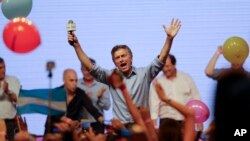Opposition leader Mauricio Macri has won Argentina's first-ever presidential runoff election.
Ruling party candidate Daniel Scioli, outgoing President Cristina Fernandez de Kirchner's chosen successor, conceded late Sunday. He told supporters he had called Macri to congratulate him.
The vote was widely seen as a referendum on the left-leaning policies of Fernandez and her predecessor and late husband Nestor Kirchner.
U.S. Secretary of State John Kerry in a statement congratulated the people of Argentina "on holding successful second-round Presidential elections on November 22, which reflects Argentina’s strong democratic values. The United States and Argentina are long-standing partners, and we look forward to working closely with President-designate Mauricio Macri and his government."
Macri, former boss of the popular football [soccer] club Boca Juniors, earned the right for the runoff against ruling party candidate Daniel Scioli after the surprising results in the October 25 polls that included four other candidates.
Numerous surveys leading up to last month's vote had Scioli, President Kirchner's chosen successor, winning.
Macri told his supporters he wants to lift capital controls and trade restrictions to win investor confidence and bring hard currency into the dollar-starved economy.
Scioli had warned that a Macri victory would subject the nation of 41 million people to the market-driven policies of the 1990s, a period of deregulation that many Argentines believe set the stage for the financial meltdown of 2001-2002.
The election comes at a time when Argentina's economy, Latin America's third largest, has stalled. Inflation is around 30 percent, gross domestic product growth is just above zero and many private economists warn that the Fernandez administration's spending is not sustainable.





